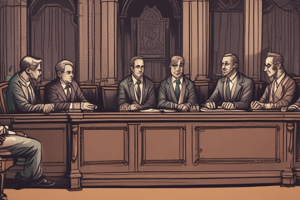Podcast
Questions and Answers
What was historically the nature of crime before it became a public offense against the state?
What was historically the nature of crime before it became a public offense against the state?
- A conflict between government entities
- A conflict between communities
- A conflict involving foreign nations
- A conflict between private citizens (correct)
What does the term 'Actus Reus' refer to in criminal law?
What does the term 'Actus Reus' refer to in criminal law?
- The legal consequences following a crime
- The physical act and circumstances of the crime (correct)
- The intention behind a crime
- The moral implications of the offense
In criminal law, what is the significance of 'Mens Rea'?
In criminal law, what is the significance of 'Mens Rea'?
- It concerns the accused's state of mind (correct)
- It assesses the physical evidence in a case
- It refers to the legal procedures for arrest
- It is a method for sentencing offenders
Which of the following is NOT an example of 'Omissions' in legal terms?
Which of the following is NOT an example of 'Omissions' in legal terms?
In the context of murder, what must the Crown establish?
In the context of murder, what must the Crown establish?
What defines 'Causation' in the context of criminal law?
What defines 'Causation' in the context of criminal law?
What does the term 'Regulatory Offences' refer to?
What does the term 'Regulatory Offences' refer to?
Which of the following is NOT a mode of participation in an offence, according to statute?
Which of the following is NOT a mode of participation in an offence, according to statute?
Flashcards are hidden until you start studying
Study Notes
Historical Origins
- Crime was historically a conflict between private citizens.
- Today, crime is a public offense against the state (R v. _______).
- Trial by ordeal involved subjecting the accused to a painful or dangerous test to determine guilt or innocence.
- Examples of trial by ordeal include the iron and infection ordeals.
Primary Sources of Law
- The Criminal Code was created in 1892.
- Regulatory offenses pertain to activities that are legal but have restrictions (ex.: drinking age or driving).
- Common law is also known as case law or judge-made law.
- Common law provides guidance as it shows how judges have previously applied the law in similar cases.
- Common law defenses help preserve a fundamental principle of justice: moral blameworthiness.
- Moral blameworthiness refers to whether the accused deserves to be punished.
- Examples of common law defenses include duress and necessity.
Actus Reus
- Latin for "Guilty Act."
- The physical acts and circumstances that must be proven beyond a reasonable doubt.
- Three parts to Actus Reus:
- Voluntary
- Conduct
- Consequences
- All three parts must be proven to establish actus reus.
Causation and Intervening Acts
- The causal link between the accused's conduct and the legal consequences is known as causation.
- Intervening act (IA): an event or act that occurs between the action and the injury, breaking the causal link.
- Example: Greg v. Wayne case.
Omissions
- The failure to act when there is a legal obligation to do so.
- Quebec's "Good Samaritan" law raises questions about whether Ontario should adopt a similar law.
- The necessities of life are affected when drugs and alcohol are involved.
Mens Rea
- Latin for "Guilty Mind."
- The accused's state of mind.
- Subjective Mens Rea:
- Intention
- Knowledge
- Recklessness
- Willful Blindness
- Objective Mens Rea: What a reasonable person would have known and done in the same circumstances.
- Modified Objective Standards: individualization.
Murder
- The Crown must prove that the accused intended to cause the death of the victim.
- There are degrees of murder.
- Self-defense has three elements.
Modes of Participation
- Party to an offence is defined in section 21(1) of the Criminal Code.
- According to the Criminal Code, anyone who is party to an offense:
- Actually commits the offense (the principal).
- Does or omits to do anything for the purpose of aiding a person to commit the offense (ex.: standing guard).
- Abets a person to commit the offense (ex.: encouraging or provoking).
Studying That Suits You
Use AI to generate personalized quizzes and flashcards to suit your learning preferences.




